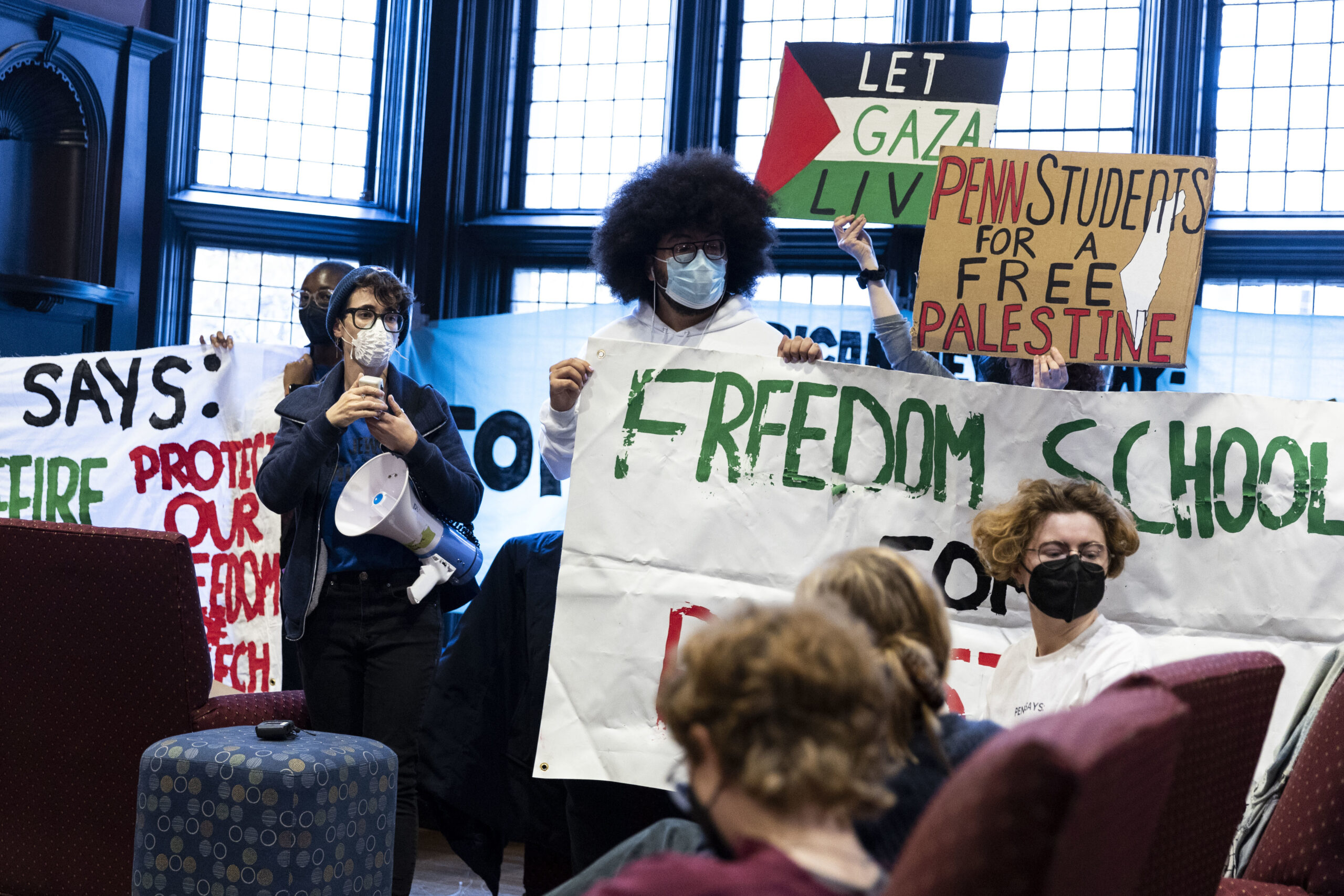

Jewish students face an unprecedented uptick in campus antisemitism, and experts argue that university response has been inadequate to the point that government action is not only permissible, but necessary.
The Washington Examiner interviewed three leading First Amendment lawyers and scholars after a recent poll revealed that Jewish students by and large feel unsafe on campus, coinciding with a 400% rise in antisemitic incidents, according to the Anti-Defamation League. They identified the line between protected speech and unprotected conduct, and how offenders and universities can be held accountable.
“Right now, we’re at a DEFCON 1 when it comes to antisemitism,” First Amendment lawyer and civil litigator Jeffrey Robbins told the Washington Examiner.
Conduct in question: Anti-Israel Demonstrations
From boycott, divest, and sanctions campaigns, to “ceasefire now” protests, the hostile conduct of campus demonstrators has included blocking and occupying school buildings, chanting slogans with genocidal implications, and intimidating Jewish faculty and students.
In January, for example, approximately 86 University of Pennsylvania faculty participated in an anti-Israel “die-in” protest that blocked a main school building. Eyewitness and UPenn Jewish student leader Eyal Yakoby told the Washington Examiner that he felt the demonstration was meant to intentionally harass and intimidate.
“It’s very clear that this speech and conduct has long been intended to intimidate Jewish students in a way to drive them underground, to degrade them, to reduce their credibility in the eyes of others, to make them feel isolated, to drain them of any willingness to support Israel, or even frankly, to express their Judaism,” Robbins said. “That’s the very intention.”
Program Officer for the Foundation for Individual Rights and Expression Haley Gluhanich told the Washington Examiner that campus protests are protected even when the views expressed are “controversial, offensive, or hateful, and even when other students simply feel intimidated, scared, or unsafe. This would remain the case if, for example, protesters were engaged in antisemitic speech.”
She said, “This means that schools cannot prohibit these protests or shut them down — they must allow them to happen and cannot take any disciplinary action against the students engaged in the protest,” except in situations where conduct crosses into unprotected speech.
On whether a protest that blocks school buildings is protected under the First Amendment, Robbins argued, “I believe that’s now not speech, but that’s conduct which is intended to physically interfere with someone’s movements.”
“The key to me in all this is reasonable time, place, and manner limitations on speech,” Former University of California president and constitutional law scholar Mark Yudof stressed to the Washington Examiner, noting that many universities lack adequate restrictions.
“A ‘die in’ that attempts to block access to buildings is not just speech; it may involve speech, but it is preventing people from freely entering and leaving a university building to which they take their classes… interfering with the educational process,” he added.
He said that such restrictions “need some teeth in it,” and that “it is not sufficient to say these are our rules, you violated them, and then do nothing. You should be able to discipline students… there may be warnings, there may be suspensions from school.”
Conduct in question: Anti-Jewish speech
In both higher education and K-12, there have been numerous reports of antisemitic slurs and slogans being used by groups and individuals, directed at Jewish people on campus and at large, including but not limited to phrases such as “Hitler was right,” “KKK,” “gas the Jews,” and translated phrases, “from the river to the sea,” and “Palestine will be Arab.”
“The first time you say ‘[from] the river to the sea,’ and someone says, ‘Well, that means there’s no state of Israel, that there could be a massive slaughter of Israeli citizens,’ you can say that’s not our interpretation.” Gluhanich said. “But if you know that’s the way it’s going to be received, that, to me, is problematic,” he said.
There have additionally been calls to boycott “zionist classes” and classes on Israel or taught by Israeli fellows, as well as rampant online harassment within campus communities. Robbins identified online harassment within such communities as a top contributor to Jewish students feeling unsafe on campus.
“There is no hate speech exception to the First Amendment,” Yudof said. “Many of the leading cases involve the Ku Klux Klan as a paradigm for racist hate speech. And on a number of occasions, the Supreme Court has protected that speech… Having said that, it is also true that the mere fact that speech is involved in an enterprise does not mean that the speech is necessarily protected.”
Gluhanich shared some types of speech that would not be protected by the First Amendment, including incitement, true threats, fighting words, and harassment. “Mere advocacy of lawbreaking or violence remains protected speech as long as it is not intended to and likely to provoke immediate unlawful action,” she said.
She said the unprotected conduct of true threats does not include “rhetorical hyperbole or the endorsement of violence,” while fighting words “only encompasses face-to-face communications.”
Robbins explained that the matter comes down to two main principles; one being that speech is protected, and the other being that the speech and conduct “is in fact intended to hurt Jews and to drive a wedge between them and their identity.” He noted that there is a point when otherwise protected speech creates a hostile environment and can subject people or schools to liability under Title VI of the Civil Rights Act.
In explaining the line between protected speech and unprotected speech that intentionally inflicts emotional distress, he pointed to common law and gave an example where in Massachusetts, “The standard was [that] in order [for something] to rise to the level of intentional infliction of emotional distress such that somebody is civilly liable for it tends to be when conduct is so outrageous and extreme that no civilized society would tolerate it.”
He said, “It’s pretty clear that a mere insult would not rise to that level,” however “a persistent course of humiliation and degradation and intimidation and harassment… can rise to the level of intentional infliction of emotional distress.”
Yudof described a “tension” between the First and 14th Amendments, guaranteeing both freedom of expression and equal protection, and explained that Title VI lawsuits are filed “against the university for creating a hostile environment… but the suit is not against individuals and does not per se seek to curtail their speech,” and compared it to when an employer is subject to a lawsuit for allowing a hostile work environment, but the offending employees are not necessarily liable.
Conduct in question: Physical violence
Jewish students on campus have also dealt with physical conduct from anti-Israel or broadly antisemitic offenders. Jewish symbols, buildings, and other property are repeatedly vandalized, and there are reports of Jewish students being assaulted, as well as a school building holding a pro-Israel event being stormed by protesters shouting antisemitic slurs, forcing Jewish students to hide in a secret location.
At Ohio State University alone in the month following the Oct. 7, 2023 attack, two Jewish students were struck in the face just off campus in what was classified as a hate crime, a Hillel building was vandalized as the vandals shouted what the CEO of OSU’s largest Jewish group described as “anti-Israel statements and threats” from the lobby, and another Jewish student was reportedly spit on, which is also categorized as a hate crime.
While physical violence is not protected under the First Amendment, the violent conduct seen in campus communities may result from the hostile environment being fostered by universities that do not hold faculty and students sufficiently accountable. This, Yudof said, could open up Title VI liability.
Yudof invoked the doctrine of true threats, noting that most threats involve speech and many people on the campus have “threatened to do things which involve physical harm, humiliation, assault and battery, and all sorts of things. They are simply not protected. The fact that speech is involved is not in the discussion.”
“We need people to be observant, and we need processes for complaints,” he said. “And there needs to be some price that’s paid if you have rules and you just ignore them, and you don’t take any action against the offending faculty or students or whomever.”
Robbins said the response to disruptions of university or college events “should be a no-brainer,” and argued that “if a university or college is serious about dealing with this stuff, then those people should be expelled.”
Yudof mentioned events that have been moved online because the schools did not feel the campus would be a safe environment for Jewish students, and said it seems “they ought to be thinking about ways to make the campuses safe, rather than keeping students and faculty members off the campus.”
Conduct in question: Discriminatory student bylaws
There have also been examples of student bylaws and decisions that discriminate against Jews and Israelis, most recently at the University of California, Berkeley Law School where zionist speakers were banned from campus by student groups.
Yudof said what he found most objectionable about the Berkeley Law School policies is that “by mere fact [of] being a zionist,” even when that is irrelevant to the subject at hand, “you’re excluded.” He called this “very problematic,” and said, “Whether it turns out to be legal, we’ll find out in the courts.”
Robbins said, “You can make the argument that if universities are authorizing or permitting their names to be used or sponsoring organizations with bylaws, which exclude people of a certain ethnic or religious identification, then universities are complicit in discrimination, and that itself is a violation of Title VI.”
On whether discrimination against zionist speakers constitutes discrimination against Jewish speakers, as not every Jewish person holds zionist beliefs, Yudof said, “every survey shows the overwhelming majority of Jewish people are, I would say, pro-Israel. It doesn’t mean they agree with all Israeli policies, it doesn’t mean they support the present government, but they identify with the Jewish homeland, which has been the Jewish homeland for thousands of years.”
A 2021 Pew Research poll found that eight in ten American Jews say caring about Israel is an important part of what being Jewish means to them, and a Dec. 2023 poll showed that 81% of American Jews support Israel in its fight against Hamas.
He explained that not every member of a community has to be insulted for conduct to be discriminatory towards the community at large, so, in his mind, policies that discriminate against zionists are therefore discriminatory against Jews.
A “nefarious” connection
When antisemitic incidents go unpunished, Robbins said, “This implies something nefarious; that universities and colleges lack the guts or the will when it comes to Jewish students to enforce the rules that you just know they would not have to be pressured into enforcing if it were other groups.”
“There are universities and colleges that are receiving a ton of money from sources that have a take on this conflict,” he pointed out. “Any university or college that refrains from taking action when it comes to antisemitism because they have in the back of their mind the thought that they might lose donations is acting in an affair in a corrupt and nefarious way.”
A 2023 ISGAP report revealed that “At least 100 American colleges and universities illegally withheld information on approximately $13 billion in undocumented contributions from foreign governments, many of which are authoritarian.”
On campuses receiving such contributions, students reported greater exposure to “antisemitic and anti-Zionist rhetoric,” as well as “higher levels of antisemitic incidents.” The report states that the relationship between those contributions and campus antisemitism “was stronger when the undocumented donors were Middle Eastern regimes rather than other regimes.”
Public schools vs private schools: A critical distinction
“Public colleges and universities are bound by the Constitution, so they are required to protect students’ and faculty members’ protected speech,” Gluhanich said. “Private colleges and universities on the other hand are not bound by the Constitution.”
She added, “However, many private institutions make institutional promises or commitments to free expression which morally, and sometimes contractually, binds them into protecting free speech — and the First Amendment is where students and faculty generally will look to as guidance as to what is protected.”
Yudof said that this difference gives private universities “much more leeway” in dealing with antisemitic conduct and argued that UPenn and Columbia University would have an easier time dealing with such problems than the University of California or the University of Texas, for example.
Robbins explained that this enables private schools and employers to have codes of conduct, and can require students and faculty who wish to be enrolled or employed at the school to abide by said code, “agreeing that if they do not, they may be subject to discipline up to and including expulsion or termination.”
Recently, three students at Vanderbilt University, a private school, were expelled, and more than a dozen were suspended after forcefully occupying an administrative building in a March 26 anti-Israel protest. Four students were arrested and charged with a crime; three with assault against an officer and staff member upon entering the building, and one with vandalism. The hammer came down on the offending students swiftly following the incident, and while there will be an appeal, the school’s private status makes it easier to follow through with such punishment.
He said it’s not as easy for public schools “because they’re a state actor,” but they’re still in a “position to have requirements that students do not engage in racist behavior, or demeaning behavior, or attacks on people’s ethnic or racial or religious heritage,” he said. “It certainly is past time to have those things in place if they’re not already in place… and to start enforcing them.”
Can the government get involved, constitutionally?
Robbins and Yudof highlighted different ways the government can play a role in holding universities accountable for fostering a hostile environment leading to unprotected conduct.
Robbins explained that when universities receiving federal funding are violating Title VI and other provisions of the civil rights laws, then it is “the responsibility of Congress and governors and presidents to take steps, and Departments of Education to hold those schools to account.”
One example of this is when former president Donald Trump signed a 2019 executive order, which sought to “enforce Title VI against prohibited forms of discrimination rooted in anti-Semitism as vigorously as against all other forms of discrimination prohibited by Title VI.”
Robbins said the government can take a number of avenues to hold schools accountable for incidents that rise to the level of civil rights violations, “including by saying we’re not going to provide federal funding; we’re not going to provide state funding. Not only is it permissible, it’s the responsibility of governmental agencies to do that.”
“The loathsome indulgence and promotion of hate on the part of those on campuses who hold themselves out as progressive is a dire problem,” he said. “And every tool in the toolbox needs to be used to address this. And if tools have to be added to the toolbox, tools should be added to the toolbox.”
“That authority already exists under Title VI,” Yudof said. “That is why, to my knowledge, every Title VI case which has been brought… eventually has been settled, because the hammer there is potentially a cutoff for federal funding.”
On the other hand, he explained how cutting off federal funding would be devastating to important research and that the Department of Education “can have a more nuanced remedy,” giving an example where NYU had to revise its discrimination policy just 10 months after Trump’s executive order in a 2020 settlement.
CLICK HERE TO READ MORE FROM THE WASHINGTON EXAMINER
“The emotional damage, the damage which is inflicted on Jewish kids as a result of conduct which universities and colleges have looked the other way at for years, is searing. It is dreadful,” Robbins said.
When universities who have been warned but have not addressed the issue are sued and have to “cough up damages,” he argued, “You may see them acting in a totally different way. And that is the kind of lawsuit which it seems to me needs to be explored. Quickly.”




